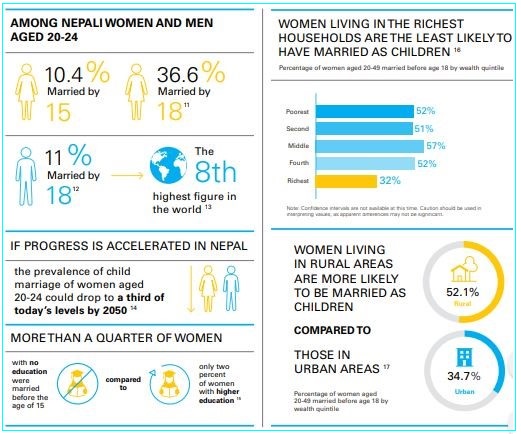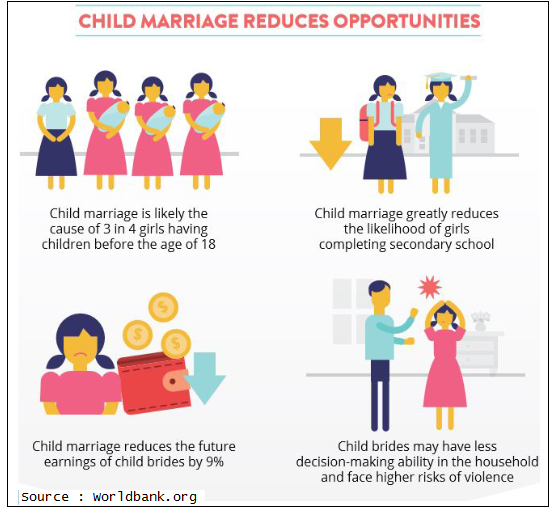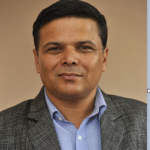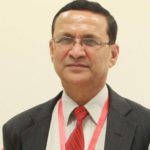The post Nepal Human Rights Report 2020: 80% Rights Violations Involve Women appeared first on Nepali Sansar.
]]>As per the report, the total number of cases of rights violation has increased to 6,642 in 2019 from 5,110 in 2018, up by 23%.
- 358 people were killed in 2019; 7 of them by the state actors including 5 cases of suspicious police encounters
The number of cases of women rights violation rose to 3,364 in 2019 from 2,824 in 2018.
- Domestic violence cases accounted for over 50% in 2019
- Rape cases increased to 530 in 2019 from 475 in 2018
- 129 women were killed by family members in 2019 with 13 cases related to dowry
As per the report, non-state actors were the main culprits in the gender-based violence cases.
“Even today, hundreds of women are facing violence for failing to provide a dowry as demanded by their in-laws,” said Bijay Raj Gautam, Informal Sector Service Centre (INSEC) Executive Director.
Although the Nepali Government has initiated several steps, including stringent laws, helplines and shelters, to curb violence against women, the rights violation cases continue to increase.
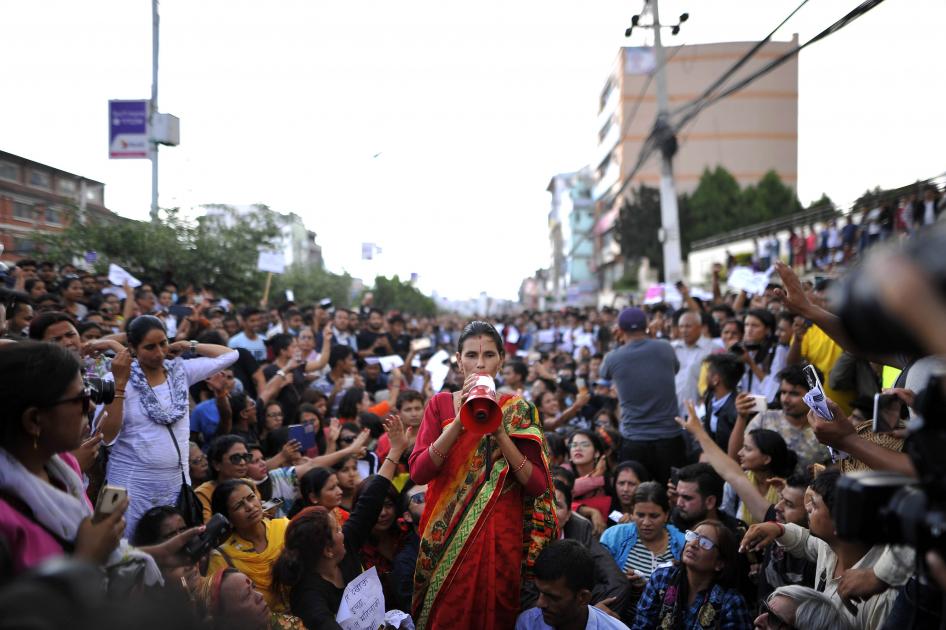
After women, children are most prone to rights violation that includes corporal punishment, child labor, trafficking, and deprivation of the right to education and health.
The number of cases of child rights violation reached 1,447 in 2019.
Nepal Human Rights Year Report 2020 was released by the Informal Sector Service Centre (INSEC), a human rights organization.
The INSEC has been collecting the data about the cases of rights violation across the nation since 1992.
More Human Rights Articles:
- UN Human Rights Commission Slams Nepal Over Child Labor and Torture Case
- Debate Intensifies on Amendment to Nepal Human Rights Bill
- Minister Gyawali Speaks Nepal Progress at UN Human Rights Council
The post Nepal Human Rights Report 2020: 80% Rights Violations Involve Women appeared first on Nepali Sansar.
]]>The post World Press Freedom Day 2019: UN Nepal Calls for ‘Freedom of Expression’ appeared first on Nepali Sansar.
]]>Under the theme, #WPFD2019 lays a special focus on challenges faced by media in elections, along with the media’s potential in supporting peace and reconciliation processes.
Along with the world nations, Nepal also observed the World Press Freedom Day 2019 on a grand scale with wide range of rallies, programs across the country.
Highlights of World Press Freedom Day 2019 in Nepal
-
UN Nepal To Government of Nepal
“On the occasion of World Press Freedom day, the UN System in Nepal wishes to remind His Majesty’s Government of its obligations to the people of Nepal as a State Party to the International Covenant on Civil and Political Rights and the Universal Declaration of Human Rights,” UN Nepal said in a statement to the Government of Nepal on the World Press Freedom Day 2019.
-
Freedom of Expression and Safety of Journalists
UNESCO Nepal observed the #WPFD2019 extending its continuous support for freedom of expression and safety of journalists. “The Office acts as a promoter of dialogue among media professionals and provides advice to media professionals, institutions and local authorities in Nepal to enhance the development of freedom of expression,” says UNESCO Nepal.
The Office has been working towards this end, and stands for “Promoting freedom of expression and freedom of the press through the celebrations of the World Press Freedom Day, held annually on May 3, 2019”.
-
Media for Human Rights
Marking the World Press Freedom Day 2019, renowned human rights body Amnesty International extended its commitment and support to journalists and other media persons as human rights defenders. The organization called for a special gathering of activists and its Nepali supporters at Shanti Batika, Ratnapark, Kathmandu. The event also saw leading human rights activists such as Charan Kumar Prasai and Subodh Pyakure. Journalists from local media houses were also present on the occasion.
Addressing the gathering, Amnesty International Nepal’s Chairperson Rajan Prasad Kuikel lauded Nepali journalists for their continuous efforts in defending public interest and Nepali public rights.
-
Special Rally in Kathmandu
On account of the #WPFD2019, a special rally was held in Kathmandu. The rally led by the Federation of Nepali Journalists took place from Babarmahal to New Baneshwar. The gathering was aimed at voicing its concerns on demonstrations, strikes and rallies that often take place in Kathmandu, motivated by ethnic or political matters and other forms of violence.
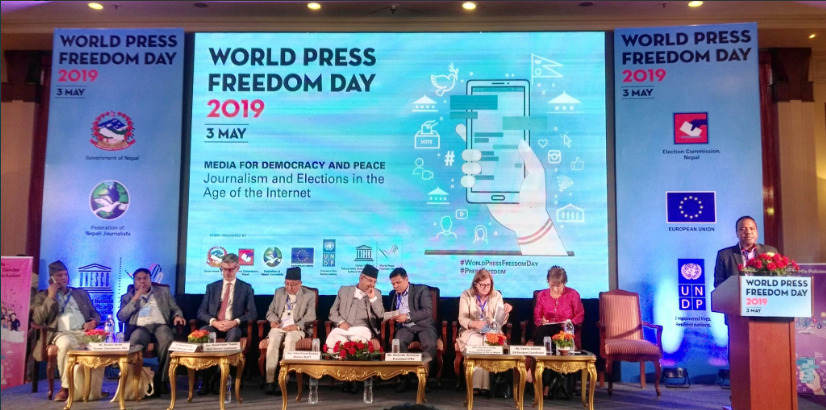
Press Freedom in Nepal
The World Press Freedom 2019 is of high significance for Nepal considering various journalists’ killings, violation of human rights and various other issues hurting the freedom of expression and public rights in the country in the recent times.
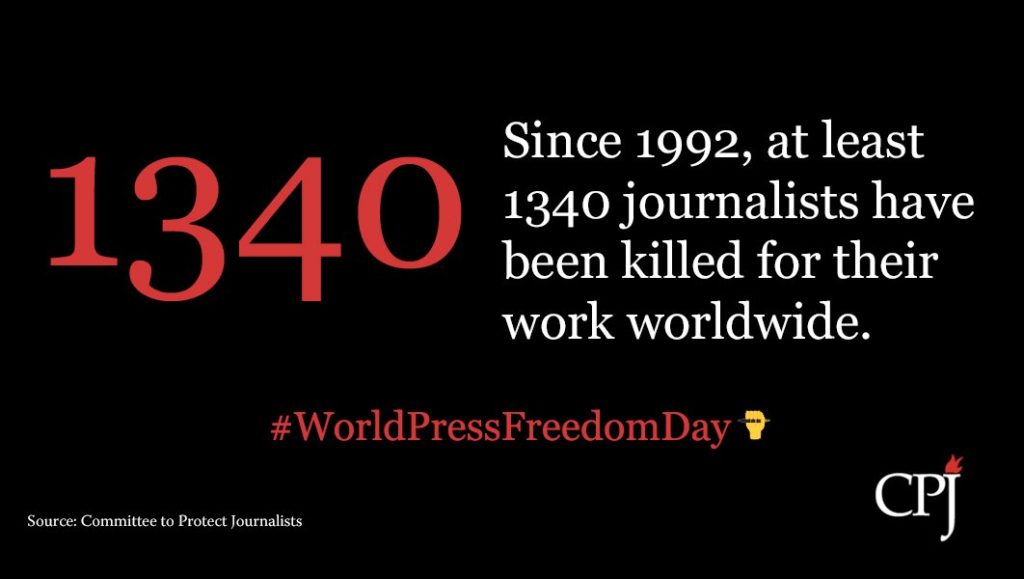
According to UN, there has been consistent intimidation of journalists across the country with many journalists losing their jobs. Arrests and nation-wide harassment of journalists hurt the freedom of expression in Nepal.
“The Constitution of the Kingdom of Nepal (1990) and the Press and Publication Act (1991) have actively safeguarded freedoms of opinion and expression, press freedom, and the right to information. Even after the lifting of the State of Emergency, freedom of expression remains suspended with the media continuing to face either direct or indirect censorship,” says UN.
According to an US-based agency called Freedom House, Nepal stands 106th in global rankings for press freedom. While Sweden, Finland, and Norway were found to be the best in terms of press freedom, Syria holds a least ranking.
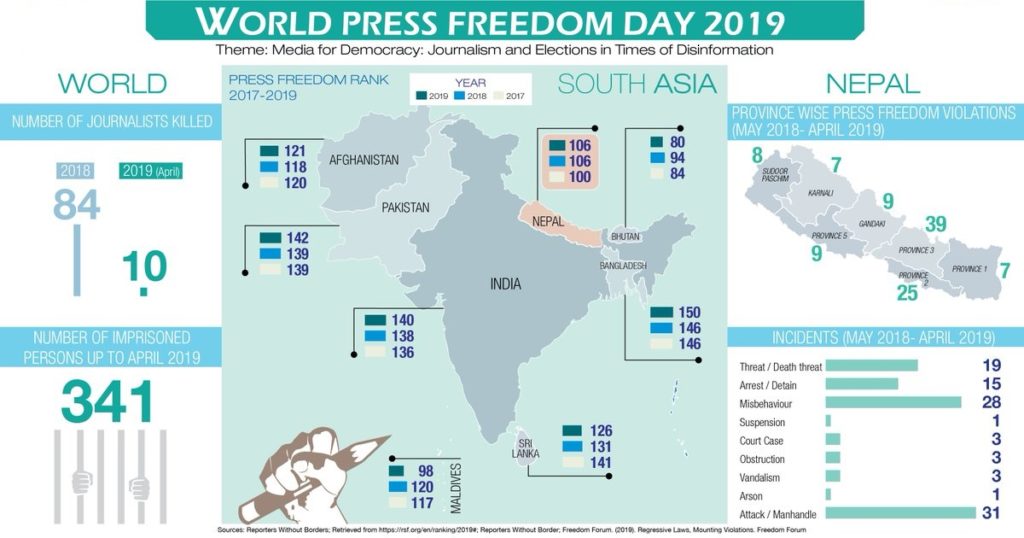
Source: NepalinData
Speaking on the occasion of #WPFD2019, National Human Rights Commission Chairman Anup Raj Sharma said there are many press-related issues across the country despite constitution amendments and long-awaited elections.
In this regard, NHRC extended its commitment to safeguard press freedom and human rights.
World Press Freedom 2019: The Background
With an aim to protect the Freedom of expression and freedom of the press as basic human rights, the United Nations General Assembly, on May 03, 1993, commemorated the annual World Press Freedom Day.
Here is the UN General Secretary Full Address on World Press Freedom Day 2019
In line with the world nations, UN Nepal has been observing the annual day with its continuing commitment to protect the principles of press freedom and freedoms of expression.
Nepali Sansar wishes Nepal journalism community the ‘World Press Freedom Day 2019’. #Bettersociety
The post World Press Freedom Day 2019: UN Nepal Calls for ‘Freedom of Expression’ appeared first on Nepali Sansar.
]]>The post AHRC Presents Real Picture of Nepal’s 2018 Human Rights Scenario appeared first on Nepali Sansar.
]]>The Asian Human Rights Commission (AHRC) observed that the Nepal Government restricted Nepalis rights by introducing harsh laws to control Human Rights NGOs and INGOs activity with its National Integration Policy (NIP).
According to AHRC press release, NIP restricts non-governmental freedom through it policies and is currently. Besides this, the Foreign Nationals Monitoring Directive provides greater surveillance and intervention over foreigners residing in Nepali, the press release read on the occasion of World Human Rights Day.
The press release further states that NIP will pose unnecessary obstacles for Nepal’s human rights NGOs and community in Nepal.
In fact, one of the policy’s key aims is to control NGOs and INGOs functioning in Nepal.
At a time when Nepal is implementing a new constitution that addresses so many vulnerable and marginalized communities grievances, it is important that human rights groups and civil society are given the ability to raise vulnerable and marginalized groups’ voices.
AHRC opines that human rights NGOs should be permitted to research problems, raise awareness and provide legal assistance to ensure justice.
Nepal’s NIP — already approved by the Home Ministry will restrict the scope of such works.
The press release also noted that strict media regulations were also introduced during the year. Besides, the government was also controlling the usage of Facebook and Twitter.
2018 was also witness to several persons getting arrested for posting comments against the government on social media platforms.
Very recently, the government also raised objections on media houses writing about 13-year old Nirmala Pant’s case. The case has been witnessing a series of misguiding events.
This year also witnessed much political debate on Nepal’s judiciary. The PM Oli led Constitutional Committee recommended Deepak Raj Joshee for the post of Nepal Chief Justice, when he was deemed completely unfit for the role.
The press release said that this was a clear indication of how vested interests were trying to influence the judiciary’s independence and integrity.
The post AHRC Presents Real Picture of Nepal’s 2018 Human Rights Scenario appeared first on Nepali Sansar.
]]>The post Nirmala Pant’s Murder Case: UN Questions Women Rights in Nepal appeared first on Nepali Sansar.
]]>After a round of local-level protests, now the case has gone forward to draw the attention of international bodies like United Nations.
In a recent update, UN Special Rapporteur on violence against women Dubravka Šimonovic termed Nirmala Pant’s murder issue as a serious ‘test case’ for Nepal Government in its respect for international human rights laws.
The UN officer said this in a press briefing on November 29, 2018, while presenting preliminary findings from her report on the state of sexual violence in Nepal.
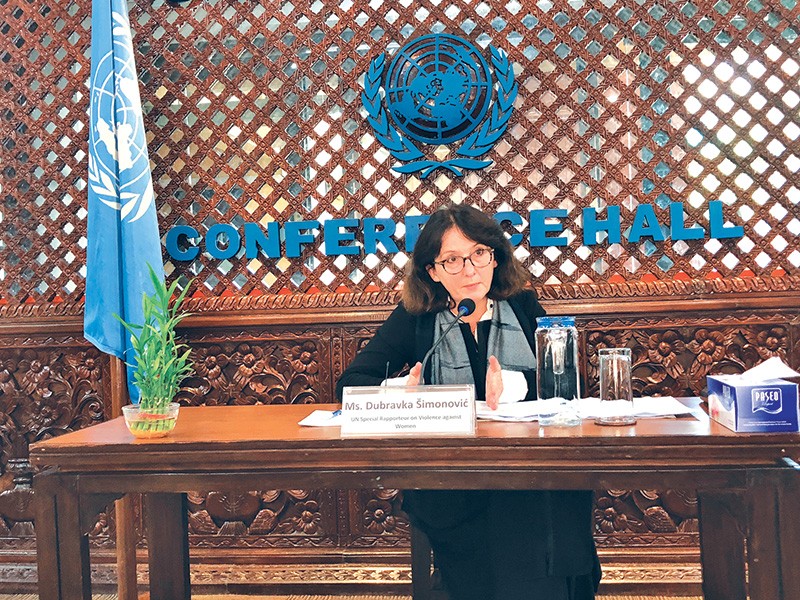
The ongoing case of Nirmala Pant is a test case for the government,” said Šimonovic. “My mandate will closely follow any developments in this case, in the hope that it will be effectively resolved in line with the human rights standards, as adopted by Nepal,” she added.
UN’s Assessment of Nirmala’s Case
The UN official’s statements are backed by her assessment of the situation during her 10-day-stay in Nepal.
Over the past 10 days, Šimonovic held meetings with various senior ministry-level officials including Minister of Women, Children and Senior Citizens Tham Maya Thapa, Attorney General Agni Prasad Kharel, Supreme Court Justice Sapana Pradhan Malla and various representatives from National Women’s Commission, National Human Rights Commission, international organisations and survivors of sexual violence.
When asked about outcomes of her meetings, she said, “I have requested more information on the case and have told them I would be following up.”
She pointed at gaps in Nepal’s development of legal framework in line with the international standards, to safeguard women rights.
“Prevalence of harmful practices such as Chhaupadi shows contradictions between high-level standards and the realities of women and girls who are still subjected to such practices. There are many laws that address those practices but those laws are still not being implemented. The main challenge is to ensure these laws and policies are fully implemented at the federal, provincial and local level,” adds Šimonovic.
According to her, there are also other laws with considerable gaps in implementation, besides women-related ones.
The UN official also found fault with provisions in the country’s Nepal Citizenship Act stating that it fails to grant a woman the same rights as a man to pass on citizenship to a child.
She said that this aspect of the Act doesn’t comply with Article 9 of the Committee on the Elimination of Discrimination Against Women (CEDAW) Convention, which Nepal has already agreed to.
Šimonovi also criticized the country’s Foreign Employment Act, stating that it limits foreign employment opportunities for women. “This banning of foreign domestic work is pushing women, particularly displaced or indigenous Dalit women and girls, into irregular immigration which is extremely dangerous,” she added.
Other key observations and recommendations that Šimonovic’s made to the government include:
- Amendment of unequal provisions in the Citizenship and the Foreign Employment Act
- Expediting the appointment of commissioners on the National Women’s Commissions
- Speeding up the process to adopt a bill needed to amend the 2014 Enforced Disappearance Enquiry, Truth and Reconciliation Act
- Issues with regard to the implementation of other laws
The post Nirmala Pant’s Murder Case: UN Questions Women Rights in Nepal appeared first on Nepali Sansar.
]]>The post #MeToo Movement Takes off in Nepal! appeared first on Nepali Sansar.
]]>Seems the #MeToo heat waves have spread to Nepal too going by the increasing number of Nepali women taking on to social media to share their sad stories witnessed over the period!
While some of them are reluctant to show their identity, some have already begun voicing their concerns on their own social media profiles!
Here are some of them from different walks of life who joined #MeTooNepal:
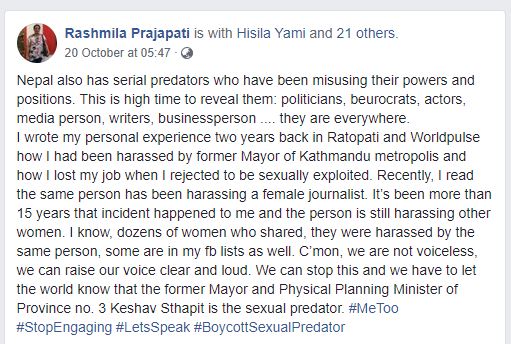
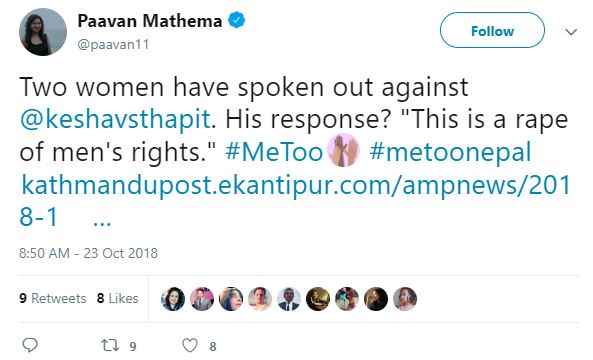
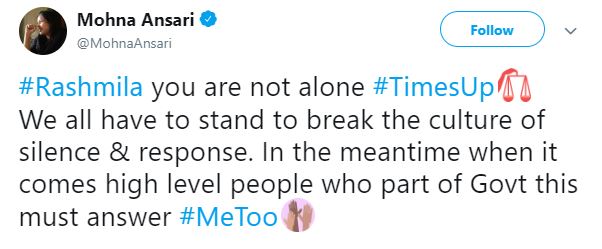

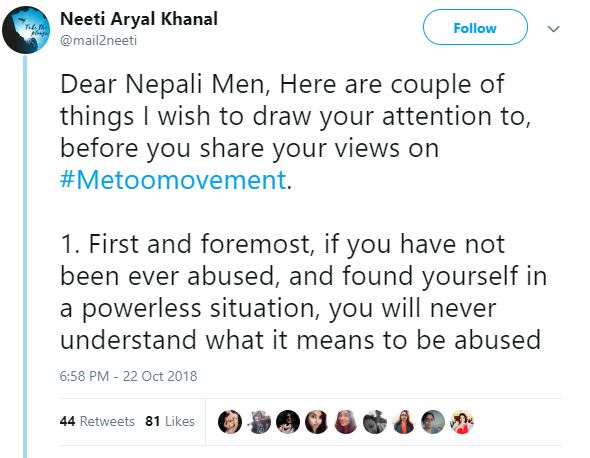
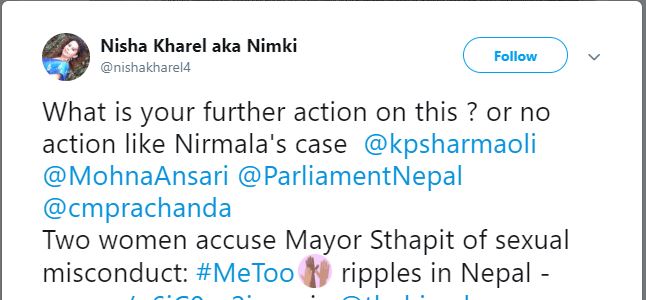
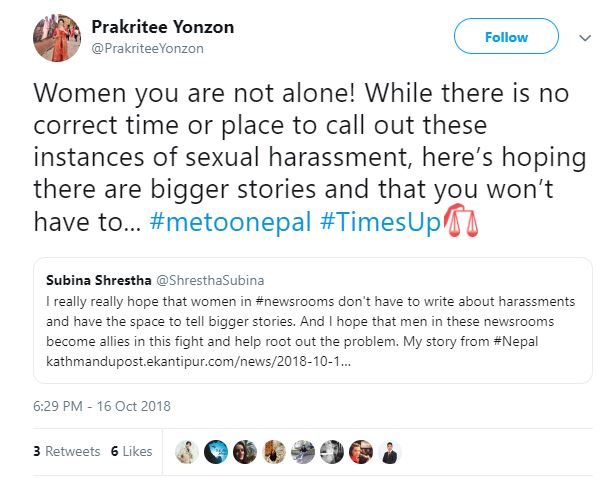
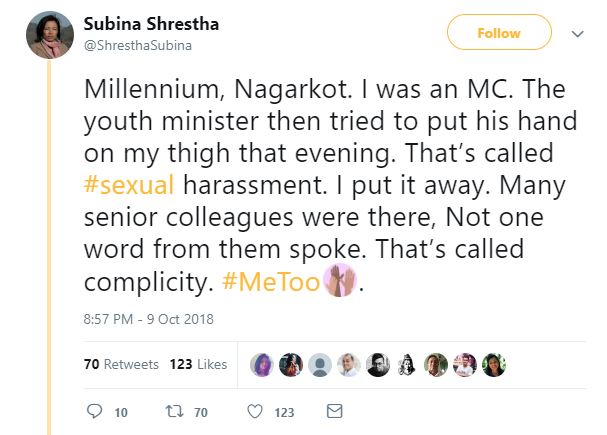
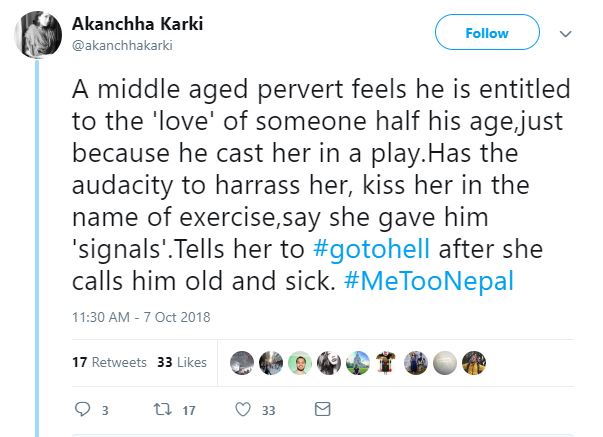
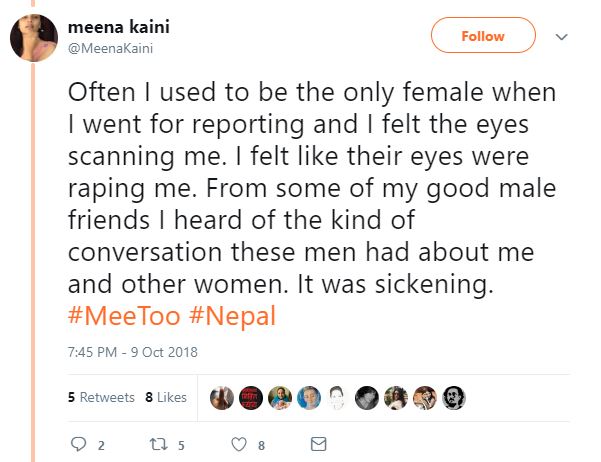
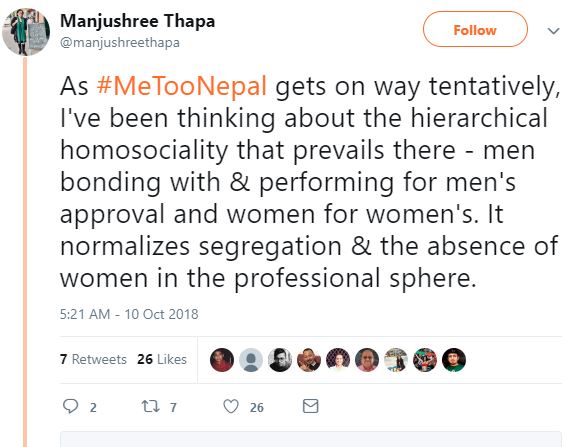
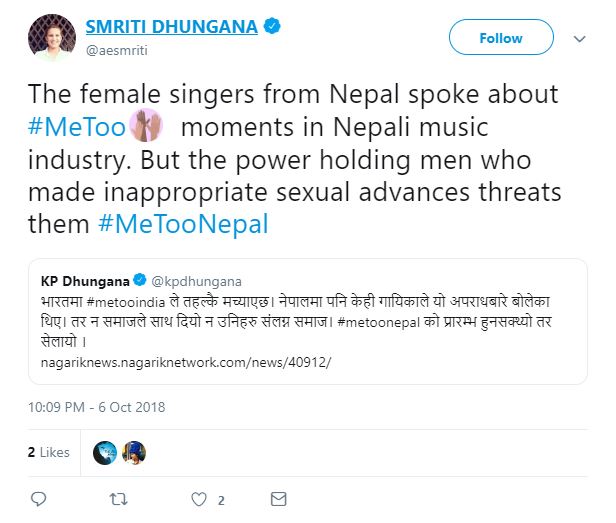
The above tweets by women from diverse backgrounds show the intensity of #MeTooNepal. A movement of this kind matters a lot for Nepal at this juncture when the country is witnessing various illicit acts against women. Besides, the government has also started taking serious measures against those involving in such activities against women, the most recent being the strict ban on online pornography!
Let’s see what more in the offing from Nepal for the protection of women rights!
The post #MeToo Movement Takes off in Nepal! appeared first on Nepali Sansar.
]]>The post Nepali Migrant Workers Rights: Govt. Urged to Act on NHRC Recommendations appeared first on Nepali Sansar.
]]>NHRC has recently recommended to the government, a 16-point document for effective management of foreign employment sector and address malpractices in the sector.
Strict monitoring of recruiting agencies and agents, immediate safeguarding of migrant workers facing challenges across foreign destinations and review of existing laws pertaining to them are among the key recommendations.
In response, the Prime Minister’s Office (PMO) forwarded the proposal to nine concerned ministries that need to give their nod for implementing the recommendations.
“The government is paying much attention to bringing back bodies of migrant workers. Similar attention should be given to those languishing in jail with no means to legal services, critically injured, and workers in coma in various hospitals. These workers should be brought back too,” says Sudip Pathak NHRC member.
What Stakeholders Said?
The recommendations were formulated after rounds of discussions among the Ministry of Labor Employment and Social, Security, Foreign Employment Promotion Board (FEPB), Department of Foreign Employment, recruiting agencies and various other concerned stakeholders.
Welcoming the proposed recommendations, stakeholders felt more such proposals would be required to address the concerns of Nepali migrant workers.
Basant Karki from the International Labor Organization (ILO) urged the government to also discuss on protecting the rights of foreign workers coming to work in Nepal and involve private sector players in enforcing recommendations.
Stakeholders called for:
- Ending discrimination of aspirant female migrant workers from moving abroad for jobs, in a bid to protect them from trafficking and exploitation
- Ratification of conventions and signing of all the possible bilateral labor agreements with the destination countries
- Empowerment of Nepali missions in foreign destinations making them capable of handling migrants’ issues
- Job security of migrant workers without any extra payment under the ‘Employer Pays’ principle
- Strict enforcement of ‘Free Visa Free Ticket’ scheme and ensure acknowledgement for every payment that migrants pay to recruiting agencies
In response, Director General at the Department of Foreign Employment (DoFE) Dilip Chapagain commended NHRC recommendations terming them ‘encouraging’ towards overhaul of Nepal’s foreign employment sector.
“The government has taken numerous measures recently to manage the sector and protect rights of Nepali workers,” said Chapagain.
Lauding the governmental efforts, NHRC Chairperson Anup Raj Sharma said, “It looks like most of the recommendations have been already implemented which is a good sign for everyone.”
Kul Prasad Karki, President of the Migrant Nepali Coordinator Committee, opined that the right implementation of these recommendations would definitely improve the foreign employment sector.
Also Read:
- Task Force Suggests New Destinations for Nepali Migrants
- Integrated System to Address Government Woes on Migrant Info
The post Nepali Migrant Workers Rights: Govt. Urged to Act on NHRC Recommendations appeared first on Nepali Sansar.
]]>The post Nepal PM KP Sharma Oli Addresses 73rd UNGA Session appeared first on Nepali Sansar.
]]>In the similar lines, Nepal has recently participated in another annual global-level conference, the 73rd edition of the United Nations General Assembly (UNGA) held in New York.
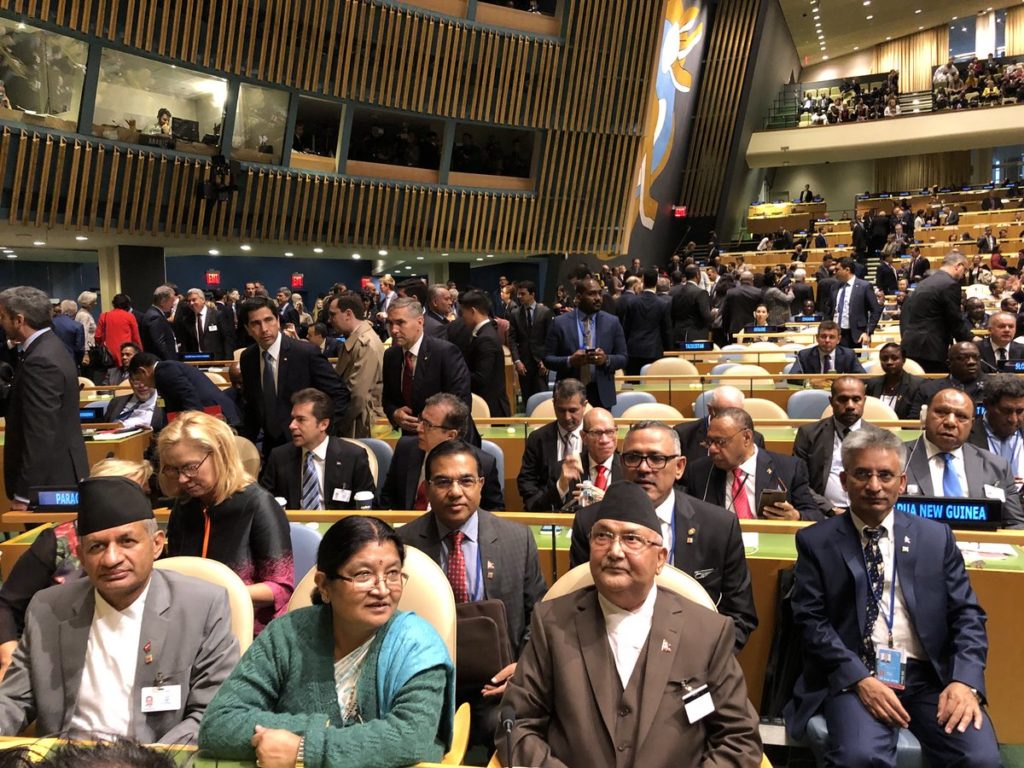
Nepali delegation, including Foreign Affairs Minister Pradeep Kumar Gyawali and others led by the country’s Prime Minister KP Sharma Oli actively participated various meetings and sessions as part of the #UNGA session.
On the side-lines of the session, PM Oli and Foreign Minister Gyawali held separate and joint meetings with heads of various states present at the session and discussed on ways to enhance Nepal’s bilateral ties with world nations.
Finally, the Prime Minister has addressed the 73rd UNGA Session on September 27, 2018.
Here is the full text of PM’s address:
I extend warm felicitations to you on your election to the presidency of this Assembly.
The outgoing President deserves our appreciation for successfully steering the Assembly’s work.
We commend the Secretary General, Mr. Antonio Guterres, for the dedication, commitment and leadership with which he has been serving the Organization.
As we commemorate the 100th birth anniversary of Nelson Mandela, I would like to pay my profound respect to him and for the cause he fought for. An iconic figure, he was a great human soul and remains a source of inspiration for peace, justice, harmony, forgiveness and reconciliation.
This year, we have lost an outstanding diplomat and visionary Secretary General Kofi Annan. I also pay sincere tributes for the tremendous contributions he made to promote peace, development and human rights in the world.
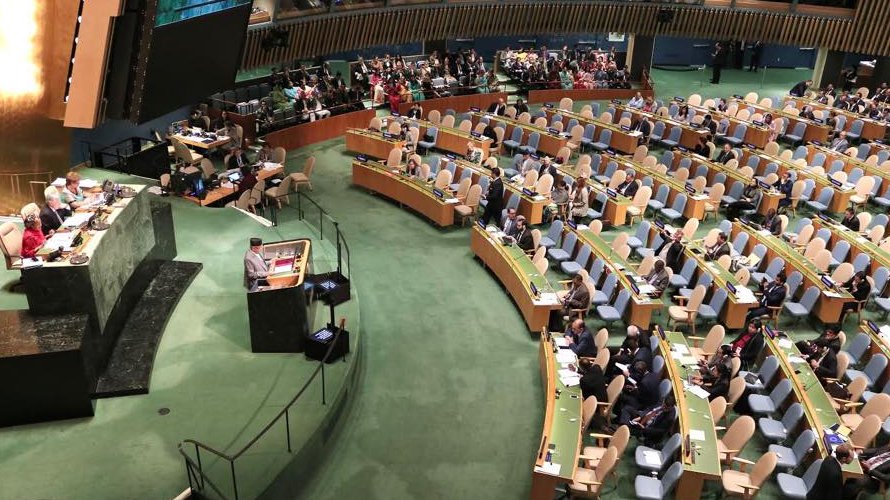
Madam President,
I bring greetings and best wishes from the Land of Buddha and Sagarmatha also known as Mount Everest for the success of this session.
Since I addressed from this podium in 2006, Nepal has undergone historic political transformation.
Through dialogue and deliberations, through mutual respect and accommodation, we steered a uniquely successful home-grown, nationally led and owned peace process.
It was about peaceful transformation of an armed conflict;
It was about restructuring of the State and promoting unity in diversity;
It was about making Nepali people truly sovereign and as source of state power; and
It was about institutionalizing and consolidating all those achievements in a democratic constitution through a popularly elected Constituent Assembly.
Despite the difficulties in the wake of devastating earthquakes, the political leaders rose to the occasion with a common resolve to promulgate the constitution in September 2015, thereby fulfilling the seven-decade long people’s aspiration to write their own constitution.
The Constitution of Nepal not only consolidates democratic polity under a federal republican order, but also embodies extensive rights and freedoms of the people. Separation of power, checks and balances, the rule of law, independence of judiciary, periodic elections, inclusive and proportional representation are the defining features of the Constitution.
Our vision is of a comprehensive democracy that empowers individuals not only politically, but also socially, economically and culturally.
Implementing the Constitution was another paramount task before us. We accomplished this historic task last year through free, fair and impartial elections of federal, provincial and local levels with record turnout and the participation of the people from all sections of our society. Most importantly, the elections brought 41 percent of women into elected bodies. We remain committed to bridging the gap of the remaining 9 percent.
The elections not only ensured democratic rights of Nepali people in the widest possible manner, it has also produced a strong government in many years. The Government that I head has over three-fourth support of the parliament. Governments in the provinces also enjoy strong majority support. We have achieved much needed political stability through these landmark elections.
With these historic achievements, we have laid the foundation towards creating an egalitarian and just society where all citizens are treated equally and receive equal protection and opportunities. Social justice remains at the center of our polity.
The United Nations and the international community supported our peace process for which we are grateful.
Nepal’s case is a unique example of peaceful and democratic transformation. It is a telling testimony that dialogue triumphs the differences; and ballot triumphs the bullets.
We believe that what Nepal has achieved in conflict transformation can be an inspiring success story for many people longing for peace in different parts of the world. We are willing to share our experiences and provide our insights.
With hard lessons learned in the arduous journey of democratic transition, we have now emerged as a confident nation, capable of sustaining political gains and undertaking a course for economic transformation. Cognizant of the need for accelerating the process of development, my Government has set a vision for ‘Prosperous Nepal and Happy Nepali’.
We will realize this vision with the right mix of prudent utilization of natural resources and the optimal mobilization and management of human resources that we are endowed with. We count on continued goodwill, support and cooperation from the international community in our development endeavors.
Our foreign policy guides us to maintain amity with all and enmity with none. It has shaped our independent outlook on global issues which we consider on merit basis.
We believe that regional and global efforts complement our national development efforts.
In line with our foreign policy priority to regional cooperation, we have recently hosted the 4th Summit meeting of BIMSTEC. We would like to see a revitalized SAARC as an important regional organization.
Excellencies,
The world today is at an important juncture; with a unique juxtaposition of perils and promises.
Challenges ranging from poverty, terrorism, climate change, food insecurity, forced displacement and natural disasters to arms race continue to confront the global community. Intra-state conflicts have taken heavy toll on millions of lives. For the first time in decades, world hunger is rising after a prolonged decline.
In many regions, peace remains obscure. Inequality within nations, as well as among them, is increasing. Countries have failed to adopt sustainable production and consumption patterns.
In this context, the theme of the general debate “Making the United Nations relevant to all people: Global leadership and shared responsibilities for peaceful, equitable and sustainable societies” resonates well the need of our time.
Madam President, Nepal supports the seven priority areas that you eloquently outlined in your inaugural address to this Assembly earlier this week.
I hope the current session will seriously deliberate on these priority areas with seriousness and urgency they deserve.
Here lies our political will and determination.
With this commitment we must ensure that the voice of the people struggling for their rights, liberty, freedom and justice in various parts of the world, including Syria, Yemen, Palestine and many other places must be heard and addressed.
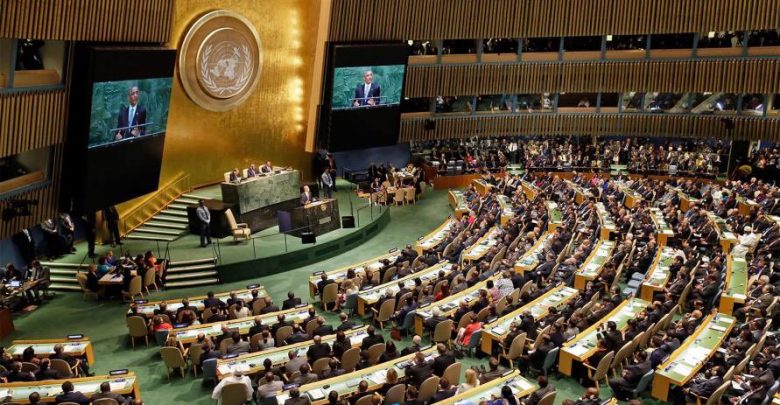
Madam President
The pursuit of making the UN relevant to all people is well captured in the philosophy of ‘leaving no one behind’.
In its third year, global efforts in the implementation of the 2030 Agenda appear too few and far insufficient. Needless to say, the least developed countries are the battleground on which the 2030 Agenda will be won or lost.
Development in LDCs appears dismal despite a record performance of global economy. International support measures are failing to make a dent. Implementation of the internationally agreed commitments made in their favor is far below our expectation.
Reaching furthest behind first is not a luxury. It is not a charity either. It is an international obligation, a duty and social responsibility.
The impact will be fully realized only when external support measures respect national ownership and leadership, are aligned with national priorities, come through national system, while they help build productive capacity, job creation and develop human resources.
Only through smooth access to market, removal of trade barriers, injecting finance and investment, building capacity and transfer of technology and overcoming the infrastructural bottlenecks can enable LDCs and LLDCs take path to sustainable development and integrate themselves in the global value chains.
Ladies and Gentlemen,
When it comes to climate change; the clock of caution is ticking loud.
The impact of climate change burdens the poorest and the most vulnerable countries, like my own country Nepal, despite their negligible emission. We cannot remain a bystander when snow-clad mountains, known as water towers of the world, are receding and glaciers are retreating, erratic weather patterns causing floods and inundation in the plains. It is an unpleasant irony that we have been victim of the catastrophes that we did not contribute for its causality.
The impacts of climate change on mountain and small island countries have been felt as existential threat. The loss of lives, properties and bio-diversity, and increasing phenomenon of calamities are becoming untenable.
A matching and robust response is required. We cannot evade from the responsibility nor will there be any excuse for inaction. We must act decisively in ensuring climate justice that respects the principle of common but differentiated responsibilities and respective capabilities. To make this happen, international cooperation and collaboration for adaption and mitigation is sine qua non. The Paris Agreement must be implemented in its entirety and good faith.
Madam President,
The health and well being of our children and youths is an investment for future. Delivering quality education, imparting skills, and spurring innovation can make a virtuous composite to enable youths to be relevant and be able to contribute to society and nation building.
We must support for the full development of their potentials, their creativity and energy to flourish. Inculcating entrepreneurial spirit and creating decent job opportunities for the youths can fuel economic development and help positively transform our societies.
At the same time, we must also inculcate them with the civil and moral values so that they become a force for harmony and tolerance in society.
Madam President,
The frontiers of technologies are ever expanding, and they have been major driving force for societal transformation. But the digital dividend is unevenly distributed, while the digital divide is widening.
Technology has been a powerful agent of change and transformation. At the same time, technological revolution is disruptive. The developing countries, especially LDCs, are struggling to cope with the new modes of production and consumption. We must create an environment to ensure easy access to affordable technology and free the barriers for their transfer. This will provide a level playing field to all countries to benefit and propel economic growth through new technologies.
Excellencies,
This year, the UN has taken boldest of the reform initiatives in decades. The cross-pillar restructuring of the organization gives us an important opportunity to strengthen its development pillar and prove its efficiency in delivery.
We believe that the re-positioned UN development system will better deliver on 2030 Agenda.
To ensure a sound system, learning the new methods by a new generation of Country Teams is important. But more than that, unlearning the old habits – that implored us to undertake this reform – is equally important.
What matters also in the reform is the transformation of the culture. The new culture must have accountability, transparency and national ownership at its core.
Nepal welcomes the reforms undertaken in peace and security architecture as well as management of the organization. UN should reflect the mosaic of its membership, and achieve greater efficiency and effectiveness.
The Security Council reform is long overdue. Any reform must reflect the current realities and ensure justice to historically under-represented and developing countries.
Ladies and Gentlemen,
Nepal reaffirms its principled stand for a general and complete disarmament of all weapons of mass destruction.
In this context, we welcome the recent efforts made by the United States and two Koreas towards denuclearization and peace and stability of the Korean peninsula.
Nepal welcomes the Secretary General’s Agenda for Disarmament with a hope of renewed impetus to disarmament. Nepal commends the beginning of deliberations under the ‘Kathmandu Process’ for developing innovative confidence building measures in the Asia Pacific region.
No region is immune from the menace of terrorism. Nepal strongly condemns all acts of terrorism, committed by whomsoever and for whatever purposes.
Nepal calls for an early conclusion of a comprehensive convention against terrorism.
Madam President,
Never has been the issue of human mobility so prominent in the agenda of the United Nations.
Nepal looks forward to the December Conference for the formal adoption of the Global Compact for Safe, Orderly and Regular Migration.
Ensuring human rights and well being of all migrant workers remain our priority. Nepal believes that the Compact will serve this purpose and make migration work for all.
Nepal has hosted thousands of refugees for decades on a humanitarian ground. The international community must uphold the refugees’ right to return to their homeland safely and with full dignity.
Madam President,
The complexities and intractability of global conflicts render the current thrust on conflict prevention even more important. Mediation, an under-utilized tool, can be applicable in all phases of the conflict continuum.
Nepal recently marked the six decades of partnership for peace with the UN. Nepal has responded to every call, even at the shortest notice and without national caveats.
Nepal welcomes the Secretary General’s initiative of ‘Action for Peacekeeping’ and has endorsed the Declaration on Peacekeeping Operations. Troops and police contributing countries must be given fair opportunities to serve at the leadership positions, both in the headquarters and the field missions.
A sustained partnership for capacity building of peacekeepers and providing for their safety and security can enhance performance of peace operations. Nepal condemns attacks on peacekeepers. Ending the indignity of sexual exploitation and abuse is a must.
Nonetheless, peace missions alone cannot substitute the home-grown preventive as well as conflict resolution measures.Our own experience tells that peacekeeping cannot do what the politically-negotiated settlements can.
Excellencies,
Nepal’s commitment to the protection and promotion of human rights is total and unflinching.
We hold that development, democracy and respect for human rights as interdependent and mutually reinforcing.
As a member of the Human Rights Council, we will continue to play our constructive role to deliver on Council’s mandates.
The ongoing transitional justice process in Nepal respects the comprehensive peace accord as well as the ground reality for sustaining peace and delivering justice. We will not allow impunity in serious violations of human rights and humanitarian laws.
Madam President,
We are living in an uncertain world. Cold-war rivalries are re-surfacing. Trade tensions are building up. Multilateralism is being questioned.
The Secretary General’s opening statement largely captures the realities of contemporary world and the sentiment of the Member States; be it in the field of peace and security or in sustainable development, climate change, migration and technology.
We underscore the centrality of the United Nations as the most legitimate multilateral forum to deliberate on the challenges that we all confront globally. It is the obligation of all Member States to preserve the sanctity of multilateralism and uphold respect for international law. The problems that we confront today at global scale can only be overcome by global collaboration and partnership in absolute trust and confidence.
We are yet to make international system truly inclusive that promotes fairness, equality and justice for all states, bigger or smaller.
Before I conclude, Madam President, let me reiterate Nepal’s profound commitment to the principles and purposes enshrined in the UN Charter. We remain as firm as we have been in past 63 years since we joined this organization.
The onus to give direction to the world lies on us. Our collective wisdom and leadership should aim at the realization of aspiration of all for peace and prosperity.
Let us make a collective resolve that the 21st century history will not be written as a history of confrontation and conflict; of poverty, exclusion and under-development; of injustice and exploitation.
It should rather be a history of cooperation and harmony; of prosperity, inclusion and development; and of justice and fairness.
Thank you.
*End of the Speech*
Source Link: The Permanent Mission of UN to Nepal
The post Nepal PM KP Sharma Oli Addresses 73rd UNGA Session appeared first on Nepali Sansar.
]]>The post Nepal Laws and Rights – A Glance from Past to Present appeared first on Nepali Sansar.
]]>While many of the world nations have strict and stringent laws that protect citizen rights, some still lack them and are in fact struggling in the fight for survival.
Nepal is one such country that has seen various transitions over centuries from the kingship rule to democratic continued to today’s federal structure.
During the process, the ‘Code of Conduct’ has always been a serious matter of discussion for the country and its people. Discrepancies in this scenario drew their roots from the country’s constitution, which itself has suffered over centuries for sustainability and stability.
Let’s take a look at how the Laws & Rights transformation happened in Nepal over the period.
Roots of The Problem
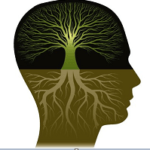 Political instability and constitutional uncertainty are the best ways to describe the laws & rights situation of Nepal.
Political instability and constitutional uncertainty are the best ways to describe the laws & rights situation of Nepal.
Post-independence era for the country began with the political instability that did not support constitutional formation.
Nepal has seen various shifts in political authority from kingship rule to multi-party system and again back to the Kingship since 1951, the year that saw the fall of the hereditary prime ministership in the country.
Finally, it was in 1990 that the country saw its new democratic constitution after the then King Birendra decided to adopt the new constitution owing to intense political pressure.
1990 is often hailed as the year that had set the foundation for the ‘Rule of Law’ in Nepal.
However, shift in authority did not stop with that.
The Article 127 of the Constitution: The Power to Remove Difficulties which states that “if any difficulty arises in connection with the implementation of this Constitution, His Majesty [The King] may issue necessary Orders to remove such difficulty and such Orders shall be laid before Parliament,” changed the game all together.
Citing the article, the Kingship rule appointed and dismissed three Prime Ministers since 2002, causing uncertainty in the country’s political situation, again.
Again, in response to the Maoist violence and delayed elections, the then King dismissed the Prime Ministership of Sher Bahadur Deuba and assumed full executive powers. Despite the arrival of series of PMs later, the real authority was in the hands of the King.
Similar situation took place in 2005 again. The King dismissed the then PM taking back his powers and declared a state of emergency.
Taking back of powers from Deuba damaged Nepal’s global status, which led to some terming the country as ‘another Uzbekistan’.
As a result of these political consequences, the law and order position in the country drastically fell down raising serious doubts about protection of citizen rights in the country.
“Nepal’s human rights and security situation has steadily declined since 2002. Nepal had the dubious distinction of having the world’s highest number of disappearances for both 2003 and 2004,” says the United States Institute of Peace (USIP) in its report published in 2005.
The report adds that the situation had gone beyond missing cases and also involves serious violations of common human rights such as extrajudicial killings, rape and restrictions on freedom of speech, assembly and association.
“All participants agreed that Nepal desperately needs a return to multi-party democracy to restore the governmental legitimacy necessary to negotiate peace with the Maoists. Such legitimacy cannot be achieved without fresh elections,” noted the report, citing panelists’ views on the situation.
A Decade Later- 2015, The Critical Year!
Fast forward to a decade, 2015 was a bad year for Nepal majorly because of the devastating earthquake that shook the country’s landscape posing threat to rights of a large number of quake victims and others.
Though 2015 saw the formation of the new constitution, violent protests around inclusion of communities belonging to the hilly regions stopped the government’s efforts to enforce rights or provide justice for wartime abuses.
In around 14 of Nepal’s most-severely affected districts, nearly 2.8 million people needed humanitarian assistance, which questions the protection of citizens and their rights in the country.
The constitution, brought into picture in 2015, left several doubts about rights and their implementation in the country, which was followed by months of violent protests.
The tense situation was largely attributed to hastily-drafted constitution that was promulgated just in a week’s time after public consultation.
Two transitional justice mechanisms were also set up in the year to ensure justice to victims of the 1996-2006 civil war.
The year also saw introduction of the “free visa, free ticket” policy in support of Nepali migrant workers in Gulf and Malaysia.
Overall, the year 2015 was really bad for Nepal, majorly because of the massive earthquake that not only led to loss of lives and structures, but also disturbed the country’s laws and rights scenario as evident in victims’ complaints about lack of governmental support, financial assistance, political fights leading to delays to setup quake reconstruction authority and failure in parliamentary functioning to address the same.
Continuing to 2016- A Little Ray of Hope!
Political instability continued even through 2016, the year that saw another change in government.
Political coalition led by Pushpa Kumar Dahal formed the new Nepal Government, the 9th one formed over the last eight years since then, giving some new hope!
Fight against age-old practices like child marriages got their due boost in the year, but little instability in the political situation at that time didn’t take that to the needed extent.
“The government has pledged to end child marriage by 2030, and in 2016 adopted a broad strategy on ending child marriage. Still missing, however, is a practical plan, and a promised process to develop one has been slow and undermined by lack of coordination and political will,” said the Human Rights Watch (HRW), a global human rights organization, in its consolidated report on 2016 events in Nepal.
The report also noted that the new constitution failed to meet the rights of nearly 4 million Nepalis who reportedly had any official status and were at risk of statelessness.
“Despite promises of reform, many people, particularly women, children born out of wedlock, or children of a refugee or naturalized parent, remain unable to secure drivers’ licenses, passports, bank accounts, voting rights, higher education, and other government welfare schemes,” HRW added.
However, the year saw little concrete progress on transitional justice pertaining to serious abuses that occurred part of civil war in 2006.
Despite strong opposition from civil societies and activists over lack of transparency in the appointment of key officials, the Truth & Reconciliation Commission and the Disappearances Commission resumed their public hearings as of August 2016 and have received around 59,000 complaints.
While the old government said it would withdraw all wartime crimes against the alleged as a pardon, the new government pledged of amending relevant laws to provide needed justice to conflict-era victims.
But, a concrete roadmap for the same remained a wait!
2017- A Game-changer Year!
2017/2074 was really a game-changer year for Nepal and its citizens majorly because of the local body and general elections to welcome a long-awaited political transition.
As envisaged, the Deuba-led Nepali Congress Government conducted the three-tier national elections for electing members for the Lower House of Parliament, House of Representatives and members for the newly-created provincial assemblies.
Nepal received global attention for these elections majorly for timely conducting and smooth flow of the electoral procedure in line with the Code of Conduct as envisaged by the Election Commission.
“Domestic and international observers characterized the national elections as ‘generally well-conducted,’ although some observers noted a lack of transparency in the work of the Election Commission of Nepal (ECN),” HRW said in its 2017 report on Nepal.
Security mechanism adopted to ensure the safety and transparency of electoral procedures earned wide recognition for Nepal from the world nations and global rights organizations.
“The government routinely investigated and held accountable those officials and security forces accused of committing ongoing violations of the law. Security personnel accused of using excessive force in controlling protests in recent years did not face notable accountability, nor did most conflict-era human rights violators,” HRW added.
The year also saw some key developments in a few conflict-era cases, but the status of those disappeared in the 1996-2006 civil conflict remained unknown.
According to HRW, there were no reports of disappearances by or on behalf of government authorities during the year. And, the new criminal code expected in 2018 criminalized disappearance.
In June 2017, the Commission of Investigation on Enforced Disappeared Persons (CIEDP) had set up five teams to initiate investigation on complaints pertaining to disappearances filed by conflict-era victims.
Despite some reforms, many other issues pertaining to rights such as lack of citizenship law even two years after the promulgation of the new constitution, among others remained a question even at the end of 2017, which concluded with giving hopes on the new Communist-led new Nepali Government that saw an outstanding victory nation-wide.
2018- Political Transformation, Race Began
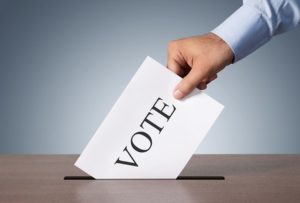 2018 is a fresh year for Nepal and its people, because of the formation of the Communist party led new government that saw KP Sharma Oli returning to power as Nepal’s new Prime Minister.
2018 is a fresh year for Nepal and its people, because of the formation of the Communist party led new government that saw KP Sharma Oli returning to power as Nepal’s new Prime Minister.
Formation of Oli-led government triggered a sudden phase of change in the country in all aspects, from internal governance to maintaining external relations.
Balancing the act, Oli Government began its journey by maintaining a balanced stance with both the Asian giants adjacent to the Himalayan nation.
Bringing in unexpected reforms in a dashing move remained the highlight of the new government as seen in proposal of new laws pertaining to criminal code and transitional justice, among others.
From Day-1, the new government has been on foray of new laws to get nearly 110 laws approved at the Parliament, failing of which leads to cancellation of all the pending laws, to support the full-fledged implementation of the new Constitution by the midnight of September 18, 2018 as per the constitutional deadlines.
August 2018 triggered new phase of development in Nepal’s rights situation beginning with the implementation of the new Civil Code Act & Criminal Code Act that envisages to bring major reforms such as action against acid attempts against women, anti-pollution measures, criminalizing rape victims, among others in the country’s legal system, replacing the 55-year old Nepal General Code.
The implementation of the new civil code on August 17, 2018 drew mixed response. While some termed it as the move to ‘suppress press freedom’, some supported it saying it is the new phase in the country’s rights situation.
As of August 2018, 73 out of 110 laws have been drafted with some of them already endorsed and 37 laws are yet to be drafted with five of them still awaiting the addition of relevant rights and the government was making moves to forward 25 of 73 drafted laws for Cabinet approval, which will further be endorsed in the Parliament.
The Government of Nepal registered 16 out of 17 key bills pertaining to fundamental rights in the Parliament on August 27, 2018. These 17 new laws under consideration make up the total 31 fundamental rights and duties as promulgated by Nepali Constitution.
Some of the bills under process at the Parliament include:
- Right to Social Security
- Right to Social Justice
- Right Against Preventive Detention
- Right of Victim of Crime
- Rights of Child
- Rights of Women
- Right to Clean Environment
Besides these, the government is also seriously working on the law to ensure sustenance allowance for unemployed citizens in line with the constitutional statute of employment for every citizen.
Besides the new ones, there are nearly 375 old laws that are still waiting amendment to comply with the constitutional rules.
Wait & Watch
The ‘Code of Conduct’ plays a key role in defining peace & harmony across social, political, religious, economic aspects, driving the country’s path to success with full-fledged public involvement.
Whatever, the laws & rights scenario of Nepal is literally a story of ups & downs. Will have to wait and watch what new the Oli-led, present Nepali Government will do to protect and safeguard the rights of its citizens!
The post Nepal Laws and Rights – A Glance from Past to Present appeared first on Nepali Sansar.
]]>The post Child Marriages in Nepal: A Long-standing Concern Awaiting Eradication! appeared first on Nepali Sansar.
]]>But, digging to what extent that’s being applicable in the today’s world sheds light on real concerns surrounding a woman/girl child. One such major concern that many world nations have been fighting for centuries is ‘Child Marriages’.
Development over the years brought in societal transformation in many nations. However, there are few nations that are yet to see a full-fledged transition in all terms. Nepal is one among them.
Despite crossing over centuries, Nepal is still fighting with some age-old practices, one of them being ‘child marriages’.
Child marriages in Nepal has been a long matter of debate bothering many communities across the country for generations, with some of them strictly following it as a customary and socially-established practice.
Key Reasons and Impact
According to international bodies who reported Nepal’s scenario so far, child marriages in Nepal are majorly attributed to the lack of awareness, literacy, openness to change, social inclusion and other aspects among the majority of the population.
Reasons leading to child marriages in Nepal are complex, says UNICEF, pointing at poverty, low value attached to daughters and lack of access to education, caste system, and patriarchal culture as major impacting factors.
A survey based on the Nepal Multiple Indicator Cluster Survey (MICS) 2014 data reports high contribution of child marriages to the increasing school drop-outs among girls in the country.
Fig.1 Reasons for school dropout among women aged 20–24 years; 40% report marriage as the reason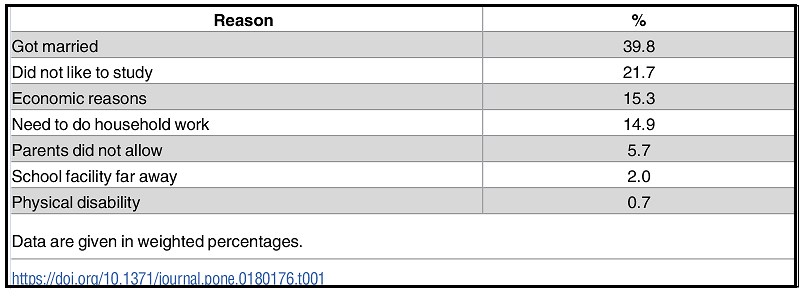
Fig. 2 Distribution of the highest grade completed by women aged 20–24 who left school due to child marriage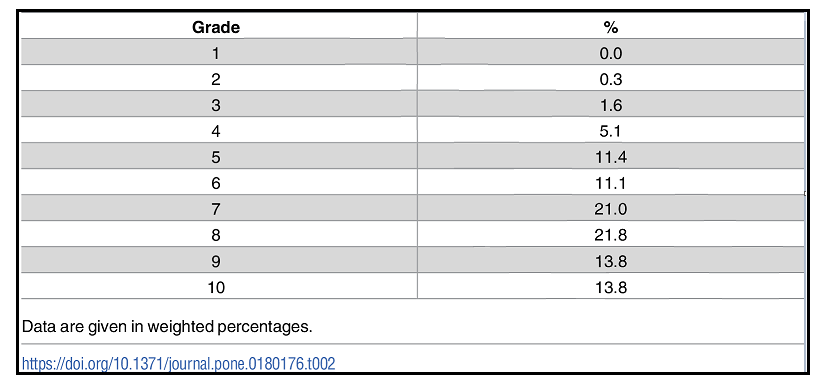
Fig. 3 Number and percentage of girls aged 15–17 by schooling status and marital status

Adding to the concerns, the April 2015 earthquake raised fears over supposed increase in number of child marriages owing to worsened situation of the public.
Key findings evaluated from various sources show:
- Nepal reports one of the highest rates of child marriages, globally
- Average prevalence of child marriage among both sexes at more than 40 percent as a whole, with girls at nearly 50 percent and boys at 30 percent
- Parents were the major factors to push for child marriages among nearly 60 percent of female cases and 55 percent of male cases
- There are also many cases where children themselves got engaged in ‘love marriages’ at an early age
- There has also been a shift in decision-making patterns from arranged marriages to love marriages, parents to children from parental pressure to love and fulfilment of sexual desire, and rural to rural-urban scenario
- A survey of households heads found 32 percent of them saying ‘parental pressure’ as a leading cause to child marriages, followed by children’s own desire and need for supporting household activities
- Early marriages were also attributed to over usage of mobile phone usage and media
- Measures to save money to be spent on organizing marriages also contributed to the rise
- Disliking among boys (from urban areas) for their first marriages often resulted in second marriages driving the need for child marriages among girls from rural areas
- Legal action against parents could control the menace to some extent in some cases, however, it did not work-out in case of children voluntarily engaging in love marriages upon self-interests
- Overall, there were hardly any genuine evidences showing child marriages as people avoided to do so owing to fears for legal matters
What Addresses the Menace?
Considering the aforementioned factors, there are few ways that renowned international rights bodies recommend, to stop child marriages. These include:
- Formation of vigilant groups and community networks with all the concerned stakeholders to check the spread of menace among the socially-marginalized communities, who are reportedly found to be more prone to the situation
- Need for spread of awareness among adolescent girls and boys on the ill-effects of getting married earlier
- Empowering young girls and boys with appropriate comprehensive sex education at the school level, along with skill-based training
- Conducting awareness programs through respective primary health centers at the community levels
- Establishment of Focused Group Discussions (FGDs) involving active local participants such as youngsters for a detailed understanding on causes, patterns and impact of child marriages and practices encouraging the same
- Programs that encourage school enrolment among girls and follow gender transformative approach should be designed
- Strengthening of networks that are combination of communities and related stakeholders from local to national levels
- To the next level, linking of local responses against the menace to the global aid organizations that can support the cause
Social and human rights organizations of Nepal feel that the existence of child marriages menace is obstructing the country’s progress in line with the Millennium Development Goals (MDGs) set by the United Nations.
Despite the existence of relevant laws that stipulate 20 years as the legal age for marriage for both girls and boys, the Ministry of Health records show nearly 30 percent of girls getting married at 15-17 years of age.
“We certainly need to strongly lobby against early marriage, but we are hampered by a very poor monitoring system to implement the existing law. Our biggest challenge is the family’s attitude towards educating their girls,” says Dibya Dawadi, Deputy Director-General, Department of Education, Nepal.
MDGs strongly pitch for few things pertaining to human rights and education. While MDG 2 pitches for universal primary education, MDG 3 finds the significance of promoting gender equality and women empowerment, MDG 4 is deeply concerned about controlling child mortality and MDG 5 calls for improvement of maternal health.
Unfortunately, child marriages work against all these MDGs stopping the sustainable growth of the Nepali citizens.
Activists feel that the change has to start from touching roots of the problem i.e. addressing unemployment, economic situation, among others forcing families to indulge in anti-social practices like child marriages.
What Key Associations & Their Leaders Say?
Unless people are made aware of devastating multi-pronged effects of early marriage, they will not strive to eliminate it from society. People should also be made aware of human rights, so that they are aware of their own rights and the rights of children. Only then will parents be motivated to ensure that their children enjoy their right to childhood – World Plan International
Child marriage is a common problem in Nepal’s rural areas. About 50 percent marriages take place before youth turn 18 due to a lack of awareness, poverty and weak enforcement of child marriage legislation. – Plan International
Women living in rural areas are more likely to be married as children those in urban areas. Nepal has one of the highest rates of child marriage in Asia – for both girls and boys. Although the legal age of unions for both sexes is 20, more than a third of young women aged 20-24 report that they were married by the age of 18, and just over one in ten by 15. – UNICEF
Child marriage deprives girls of educational opportunities. However, supply-side issues such as poor access to school, low quality of educational provision, and poor skilled employment prospects, as well as demand side challenges such as concerns over safety and security or the need for unpaid household labor may be important contributing factors to child marriage. Girls may therefore discontinue their education due to a range of factors and then, as they are unable to complete their education, enter into marriage. – A Study based on the Nepal Multiple Indicator Cluster Survey (MICS) 2014
Early marriage should be stopped because it not only affects girls’ education but also their health. After marriage, these girls rarely come back to school and even if they do, their performance is very poor. Early marriage negatively impacts their self-confidence. – Sumon Tuladhar, Education Specialist at UNICEF Nepal
Sticking a mother in jail is not helpful when she may have other young children with no one to feed and protect them. Child marriage is extreme denial of children’s rights. Many girls also suffer from abusive marriages as they are married to older boys. – Helen Sherpa from World Education
Child marriage not only discriminates against women and girls in Nepal, it is a violation of their basic human rights. Young brides are pressured to give birth soon after marriage and are susceptible to both domestic and sexual violence—escalating harms that have a profound negative impact on the health, education, employment and dignity of women and girls. The government of Nepal has an immediate obligation to stop child marriage. – Melissa Upreti, Regional Director for Asia, Center for Reproductive Rights
The government needs to prioritize the implementation of laws prohibiting child marriage in Nepal. We have to guarantee that our women and young girls can exercise their constitutionally protected rights and end this discrimination against them in the name of marriage. – Seikh Chand Tara, Chairperson, National Women Commission
On an End Note
Hope, continuous efforts by governments in the form of laws and human rights activists supported by global aid agencies will address the long-standing menace of child marriages in Nepal, contributing to the country’s developmental path.
The post Child Marriages in Nepal: A Long-standing Concern Awaiting Eradication! appeared first on Nepali Sansar.
]]>The post Nepal Criminal Code Draws Criticism, ‘Press Freedom’ Plays Vital appeared first on Nepali Sansar.
]]>Oli Government’s new Criminal Code seems to have started spreading heat waves across the country. As usual, the heat began with the ‘media’ pointing at the new law!
Nepal’s media community has reportedly raised concerns over the new law saying that the new criminal code is suppressing the press freedom.
Press associations have claimed that the government is using the ‘code’ as a tool to silence critics.
Journos Take on Criminal Code
“These general laws can be misused to silence journalists and discourage investigative reporting,” says Govinda Acharya, President, Federation of Nepalese Journalists.
According to Acharya, the new codes have nearly 200 provisions to curtail the press freedom.
“Though several provisions in these codes are positive, almost all sections from 21 to 306 will pose a threat to free press and freedom of expression in one way or the other,” Acharya adds.
Whereas, Press Council Nepal President Borna Bahadur Karki says, “the provisions against press freedom can be amended accordingly, but it is not appropriate to interpret the laws wrongly.”
Meanwhile, Nepal’s popular political cartoonist Rajesh K.C. termed the new law as a means to ‘authoritarianism’.
“Our work is to point out mistakes and abuses of those in power, but these laws can force self-censorship,” says Rajesh, who is known for his satirical cartoons on social issues and country’s politics.
Another premier state-owned media house urged the government to reconsider the law, stating that the new law has lot of scope for interpretations and could be used to prosecute journalists.
“These general laws can be misused to silence journalists and discourage investigative reporting,” says a senior advocate Dinesh Tripathi. Tripathi feels that the new laws placed press freedom at stake.
Badri Sigdel, president of Nepal Press Union (NPU), says the new code is violating the Constitutional provisions and is keen on controlling the press rights.
Thrashing all statements, Senior Superintendent of Police Thakur Gyawali at the Central Investigation Bureau of Nepal Police says, “Since the new laws have come into force upon their publication in the Nepal Gazette, all should abide by the provisions mentioned therein.”
“Whether or not the laws are against press freedom will come to light in the course of their implementation,” adds Superintendent of Police Narendra Upreti at Kathmandu Metropolitan Police Crime Division.
What’s Criticism in the Code?
The new code has drawn wide criticism majorly for following reasons, i.e.
- It considers sharing confidential information as a jailable offense
- It subjects any individual, involved in publishing of private information or recording audio or capturing pictures without permission, up to three years jail along with a fine
- It considers as an offense any act that intends to damage an individual’s reputation either personally or through satires
- It replaces the country’s 165-year-old practice of ‘Muluki Ain’
- It calls for prosecution of any medical professional causing a patient’s death while undertaking treatment
- It calls ‘unauthorized reporting of communication between two people’ as a serious crime
Now, its worth-wait to see what more mixed reactions the new Criminal Code would drive from other sections of the society too!
Also Read
The post Nepal Criminal Code Draws Criticism, ‘Press Freedom’ Plays Vital appeared first on Nepali Sansar.
]]>